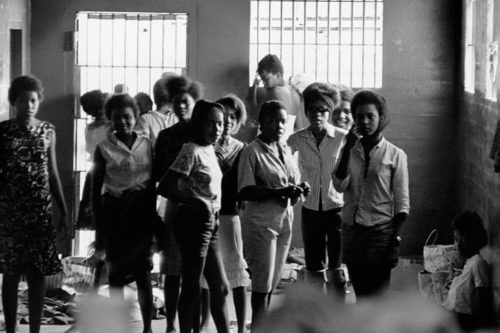Hidden Herstory: The Leesburg Stockade Girls
Share
Explore Our Galleries
Breaking News!
Today's news and culture by Black and other reporters in the Black and mainstream media.
Ways to Support ABHM?
By Tulani Salahu-Din, National Museum of African American History and Culture
I never fully realized the monumental role that massive numbers of children played in civil rights protests. Law enforcement arrested and jailed children by the thousands for days, and sometimes months, and their involvement helped to enable one of the greatest legal and social assaults on racism in the 20th century—the Civil Rights Act of 1964. The Leesburg Stockade Girls are an incredible example of these courageous, young freedom fighters.

Leesburg, Georgia. Arrested for Demonstrating in Americus, Teenage Girls Are Kept in a Stockade in the Countryside, © Danny Lyon/Magnum Photos, Collection of the Smithsonian National Museum of African American History and Culture.
You may ask, “Who were the Leesburg Stockade Girls?” In July of 1963 in Americus, Georgia, fifteen girls were jailed for challenging segregation laws. Ages 12 to 15, these girls had marched from Friendship Baptist Church to the Martin Theater on Forsyth Street. Instead of forming a line to enter from the back alley as was customary, the marchers attempted to purchase tickets at the front entrance. Law enforcement soon arrived and viciously attacked and arrested the girls. Never formally charged, they were jailed in squalid conditions for forty-five days in the Leesburg Stockade, a Civil War era structure situated in the back woods of Leesburg, Georgia. Only twenty miles away, parents had no knowledge of where authorities were holding their children. Nor were parents aware of their inhumane treatment….
Their story was part of the broader Civil Rights effort that engaged children in a variety of nonviolent, direct actions. In Alabama, for example, thousands of youth participated in the 1963 Children’s Crusade, a controversial liberation tactic initiated by James Bevel of the Southern Christian Leadership Conference (SCLC) and led by Dr. Martin Luther King, Jr. After careful deliberation about the merit of involving children in street protests and allowing them to be jailed, Dr. King decided that their participation would revive the waning desegregation campaign and would appeal to the moral conscience of the nation.

Alabama Fire Department Aims High-Pressure Water Hoses at Civil Rights Demonstrators, © Charles Moore, Collection of the Smithsonian National Museum of African American History and Culture.
On May 2, 1963, in response to an invitation from Dr. King, roughly a thousand students—elementary through high school—gathered enthusiastically at Sixteenth Street Baptist Church and joined a civil rights march throughout the streets of Birmingham. By day’s end, law enforcement had jailed over 600 children….
The history of children’s Civil Rights activism continues to be important to tell. The Leesburg Stockade Girls realize this importance, and they are documenting their story. In 2015, as the keynote speaker at a commemorative event for the Leesburg Stockade Girls at Georgia Southwestern State University, I engaged with ten of the surviving women, who shared recollections about the day of their arrest. Remarkably, these women still possess a collective spirit of resistance to social injustice, and they are beginning to embrace their place in history.
Read the full article here.
Read more Breaking News here.
View more galleries from the ABHM here.









Comments Are Welcome
Note: We moderate submissions in order to create a space for meaningful dialogue, a space where museum visitors – adults and youth –– can exchange informed, thoughtful, and relevant comments that add value to our exhibits.
Racial slurs, personal attacks, obscenity, profanity, and SHOUTING do not meet the above standard. Such comments are posted in the exhibit Hateful Speech. Commercial promotions, impersonations, and incoherent comments likewise fail to meet our goals, so will not be posted. Submissions longer than 120 words will be shortened.
See our full Comments Policy here.